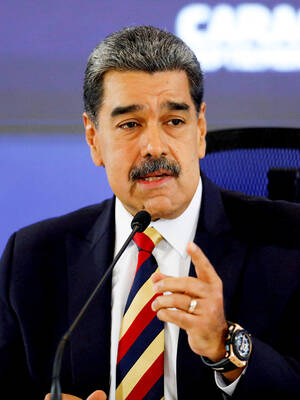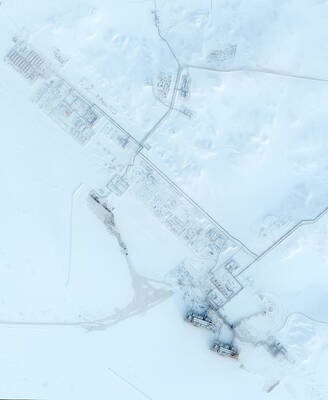Bhutan’s rare form of polygamy, in which men or women take several sisters or brothers as partners, is dying out as the kingdom modernizes, with last week’s royal wedding another sign of its demise. The king, 31-year-old Jigme Khesar Namgyel Wangchuck, married and crowned Jetsun Pema, the commoner daughter of an airline pilot, on Thursday in a colorful Buddhist ceremony in the ancient capital of Punakha.
In his speech announcing the nuptials in May, Wangchuck made clear that Pema would be his only wife — a distinct departure from his father, who married four sisters in 1979, all of whom were crowned queen in the same ceremony.
The Wangchuck dynasty dates back to 1907 and includes four other kings before the current monarch, three of who married multiple women.
The practice has its roots in traditional Bhutanese social structures, explained Francoise Pommaret, an expert and author on Bhutan.
“Living with several sisters, mostly found in the center or the east, or with several brothers, mostly found in the north, allowed them to keep property in one family,” she said.
The decline in polygamy is linked to changing attitudes in Bhutan, a tiny Himalayan nation sandwiched between India and China that has resisted outside influence for centuries.
The country banned television until 1999 and continues to restrict the number of tourists who visit its stunning mountains and valleys with rules ensuring minimum spends of up to US$200 a day.
However, with TV and the Internet now widely available and foreign education more common, young Bhutanese are increasingly turning their backs on some of the more unusual parts of the local culture.
Polygamy exists now only in small nomadic communities which live with their animals for most of the year high in the Himalayas, according to Dasha Karma Ura from the Center for Bhutan Studies, a think tank.
“The king is rooted in the modern age. He announced to the country during his address to the parliament that they’ll [he and his bride] devote their life to each other until his death,” he said.
The king’s monogamous intentions are not the only difference between him and his father, who abdicated voluntarily in 2006 to make way for his son and a fledgling democracy.
The young Wangchuck is openly affectionate, holding hands with his new queen and even kissing her in public on Saturday on the last of three days of public celebrations to mark the event.
Public displays of affection are not uncommon in Bhutan, but the sight of the love-struck king being so open with his emotions represents a severe rupture from the past.
“We know that they love each other so much,” said high-school student Rinzin Dema, who was in the crowd to see the royal couple on Saturday.
“Seeing our king and the queen, it’s like an inspiration to us that in the future we should be the same husband and wife like that,” he added.
Pommaret says the idea of relationships has changed, partly because of soap operas on TV.
“Relationships on the basis of practical considerations have given way to the idea of romantic love. And the king is an example,” she said. “You should have seen him go red in the parliament when he announced the name of his fiancee!”
The head of the opposition in parliament, Tshering Tobgay, said he remembered many more polygamous couples as a child, but now there are barely any in or around the capital.
He joked that he would be interested in multiple wives — if only it were practical.
“I’d love to do it, but I can’t see how I could be happy,” he said.

VENEZUELAN ACTION: Marco Rubio said that previous US interdiction efforts have not stemmed the flow of illicit drugs into the US and that ‘blowing them up’ would US President Donald Trump on Wednesday justified a lethal military strike that his administration said was carried out a day earlier against a Venezuelan gang as a necessary effort by the US to send a message to Latin American cartels. Asked why the military did not instead interdict the vessel and capture those on board, Trump said that the operation would cause drug smugglers to think twice about trying to move drugs into the US. “There was massive amounts of drugs coming into our country to kill a lot of people and everybody fully understands that,” Trump said while hosting Polish President

Japan yesterday heralded the coming-of-age of Japanese Prince Hisahito with an elaborate ceremony at the Imperial Palace, where a succession crisis is brewing. The nephew of Japanese Emperor Naruhito, Hisahito received a black silk-and-lacquer crown at the ceremony, which marks the beginning of his royal adult life. “Thank you very much for bestowing the crown today at the coming-of-age ceremony,” Hisahito said. “I will fulfill my duties, being aware of my responsibilities as an adult member of the imperial family.” Although the emperor has a daughter — Princess Aiko — the 23-year-old has been sidelined by the royal family’s male-only

A French couple kept Louise, a playful black panther, in an apartment in northern France, triggering panic when she was spotted roaming nearby rooftops. The pair were were handed suspended jail sentences on Thursday for illegally keeping a wild animal, despite protesting that they saw Louise as their baby. The ruling follows a September 2019 incident when the months-old feline was seen roaming a rooftop in Armentieres after slipping out of the couple’s window. Authorities captured the panther by sedating her with anesthetic darts after she entered a home. No injuries were reported during the animal’s time on the loose. The court in the

Another tanker carrying liquefied natural gas from Russia’s sanctioned Arctic LNG (liquefied natural gas) 2 project has docked in a Chinese port, ship-tracking data showed, days after Russian President Vladimir Putin met Chinese President Xi Jinping (習近平) in Beijing. The London Stock Exchange Group (LSEG) tracking data indicated the Russian Voskhod LNG tanker was anchored at an LNG terminal in the port of Tieshan in Guangxi, China. The Russian flagged tanker, with a cargo of 150,000 cubic meters of LNG, was loaded up at the Arctic LNG 2 facility in Gydan in northern Siberia on July 19, LSEG data showed.